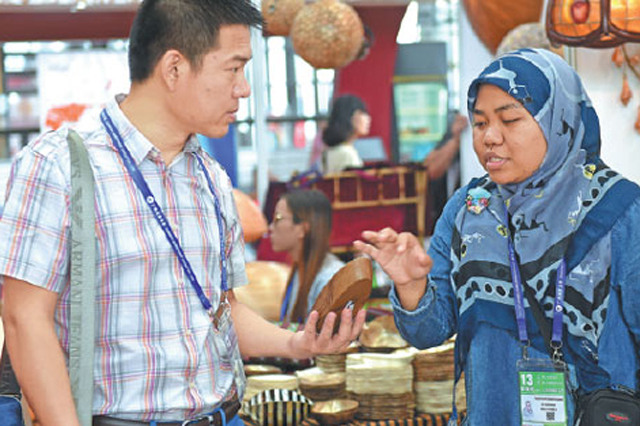


 |
An exhibitor from Indonesia promotes her products to a Chinese buyer at the China-ASEAN Expo last year in Nanning, capital of the Guangxi Zhuang autonomous region. [Photo/Xinhua] |
A boom in imports from countries and regions related to the Belt and Road Initiative is expected in China this year, and the country's investment in these destinations will likely grow, a former vice-minister of commerce said.
China will likely import more high-quality agricultural and industrial products, cutting-edge technologies, and luxury goods from these regions, said Wei Jianguo.
His expectation is based on an evaluation of mutual benefits that all sides stand to derive from the initiative.
Wei, also a vice-president of the China Center for International Economic Exchanges, a government think tank, told China Daily that an import boom will not only meet China's growing domestic demand but contribute to the growth of the rest of the world.
In this regard, he called on the government departments concerned to further reduce tariffs, and accelerate the opening up of financial, medical and healthcare sectors.
Wei's views are in line with recent industry figures.
Data show China's imports from economies related to the initiative grew faster than exports in the first quarter.
In the first three months of this year, trade in goods between China and the Belt and Road economies amounted to 1.65 trillion yuan ($239.8 billion), up 26 percent from a year earlier, according to the Ministry of Commerce.
Specifically, imports surged by 42.9 percent year-on-year to 717.7 billion yuan, taking up a quarter of the country's total imports, while exports increased by 15.8 percent year-on-year.
In addition to tighter trade ties, cross-border investment will see a similar uptrend, Wei said.
Wei said an increasing number of Chinese State-owned and private companies will invest in the economies related to the initiative this year, especially after the Belt and Road Forum for International Cooperation.
"They should diversify their investment portfolios, and lay more emphasis on cultural products, which will help nurture China's soft power," he said.
Though the initiative has been maintaining a good momentum, Chinese companies are often exposed to greater unexpected obstacles when expanding overseas, Wei said.
Homegrown companies, especially those run privately, are in need of accurate, substantial information about potential investment destinations, their preferential policies and investment process, Wei said.
In addition, risks in host countries, such as changing local policies and fluctuations in foreign currency exchange rates, play a decisive role in investors' sustainable development and profitability, Feng Guanghua, chairman of China Bond Rating Co Ltd, said at a news conference.
To facilitate Chinese companies' efforts to go global, Wei said the CCIEE is intensifying efforts to create a large database that can collect and update information on companies' needs and conditions in destinations.
"With such shared data, it's easier for enterprises to make prudent investment decisions through analyses of project risks and local preferential policies," Wei said.
The database, accessible through a website open to public, will go online this month, after the forum, according to Wei.
© China Daily Information Co
